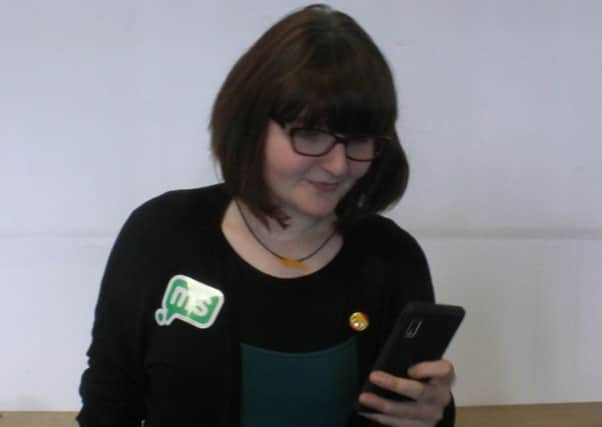Stornoway woman helping thousands with multiple sclerosis


Called ‘MS Reporters’, the smartphone initiative has been hailed by leading Edinburgh NHS neurologist Belinda Weller as a shining example of how every-day technology could help to bridge the gap in healthcare information for thousands of people in Scotland living with MS and many other long term medical conditions.
With the NHS under pressure and less time available with specialists, there is an increasing expectation on patients with long term medical conditions, such as MS, to self-care.
Advertisement
Hide AdAdvertisement
Hide AdThere are over 11,000 people with MS in Scotland, making MS more common in Scotland than most other countries in the World.
More patients are going online seeking advice, support and the latest research news.
But there remains a desperate lack of trusted information available direct from healthcare professionals for patients which is easy to access and understand.
MS Reporters (www.shift.ms/msreporters) empowers people with MS (MSers) by enabling them to access the latest healthcare information and expert opinion from some of the UK’s leading MS specialists and researchers regardless of where they live.
Advertisement
Hide AdAdvertisement
Hide AdAs a result MSers are better equipped to self-manage their condition and more aware of emerging new treatments which could benefit them.
They are also less reliant on GPs between specialist appointments – good for patients and for shrinking NHS budgets.
How MS Reporters works
Shift.ms trains volunteers with MS to become citizen journalists, known as ‘MS Reporters’ and matches them with leading MS consultants and researchers at specialist neurology/MS centres across the UK.
Using ordinary smartphones, MS Reporters interview these experts, asking questions submitted by fellow members of the Shift.ms online community.
Advertisement
Hide AdAdvertisement
Hide AdThe interviews are edited and added to a video library of expert knowledge which is free and accessible for people with MS worldwide.
Kirsty was diagnosed with MS while at University at just 18 years old. As an MS Reporter, she has interviewed Belinda Weller, Consultant Neurologist at the Anne Rowling Centre on two occasions to ask questions on behalf of the MS community.
The interviews are filmed on a smart ‘phone with a microphone and an egg timer to ensure they’re kept short, before being edited and published online by the team at Shift.ms.
Just two ten minute interviews with Belinda have enabled Kirsty and Shift.ms to produce ten short snappy videos, presenting easy to understand expert information which can be viewed online for free by MS patients anywhere in the World.
Advertisement
Hide AdAdvertisement
Hide AdKirsty says: “MS Reporters is empowering people with MS by giving them the information they need in a way they can understand.
“Our aim is to create a giant hub of information, where MS-ers can go to get answers any questions they might have relating to research, the latest drugs, pregnancy – you name it, we cover everything.
“I grew up in Stornoway, so I understand only too well that for people living in remote areas of Scotland, getting access to specialist centres is very difficult, though of course if you have MS then mobility problems can make it hard wherever you live.
“The remote areas also have a high incidence of MS, so MS Reporters will I hope be hugely beneficial to those communities.”
Advertisement
Hide AdAdvertisement
Hide AdThe pilot launch of MS Reporters two years ago coincided with the release of the NHS’s 5 Year Forward View which outlined the need to find new ways to help patients with long term medical conditions to self-care.
The report highlighted that long term health conditions, rather than illnesses susceptible to a one-off cure, take 70% of the health service budget.
MS Reporters has been well received by both the MS community and healthcare professionals. The model has already been successfully adopted by two other charities - Shine Cancer Support and Join Dementia Research - demonstrating its potential to help hundreds of thousands of patients with long term medical conditions in future.
Thanks to the backing of the Wellcome Trust and Comic Relief, MS Reporters will be scaled up over the coming months and the model shared with other charities and organisations within the medical world and beyond.
Advertisement
Hide AdAdvertisement
Hide AdDr Belinda Weller, Consultant Neurologist at the Anne Rowling Centre in Edinburgh, and one of the Scotland’s leading MS experts, is among those taking part.
Dr Weller says: “MS Reporters is a wonderful example of how every day technology can be used to ensure that vital information reaches patients with long term conditions, particularly young people.
“Undoubtedly it’s the patients who have the most, good quality, up to date information who will be the ones who can self-manage most effectively.
“MS Reporters offers patients another invaluable layer of support which compliments existing NHS provision. It’s empowering for patients to be asking the questions and interviewing specialists themselves.
Advertisement
Hide AdAdvertisement
Hide Ad“The model could also help to alleviate the pressure on NHS services, for GPs in particular, as that’s where patients often turn between specialist appointments.”
Shift.ms has so far trained 35 citizen reporters and teamed them with leading MS experts from specialist MS centres in Edinburgh, London, Leeds, Salford, Liverpool and Dublin.
Reporters can be trained remotely, making the scheme accessible to MSers regardless of where they live or how mobile they are because of their condition.
There are now over 100 MS Reporter videos which can be viewed: http://www.shift.ms/msreporters|here}